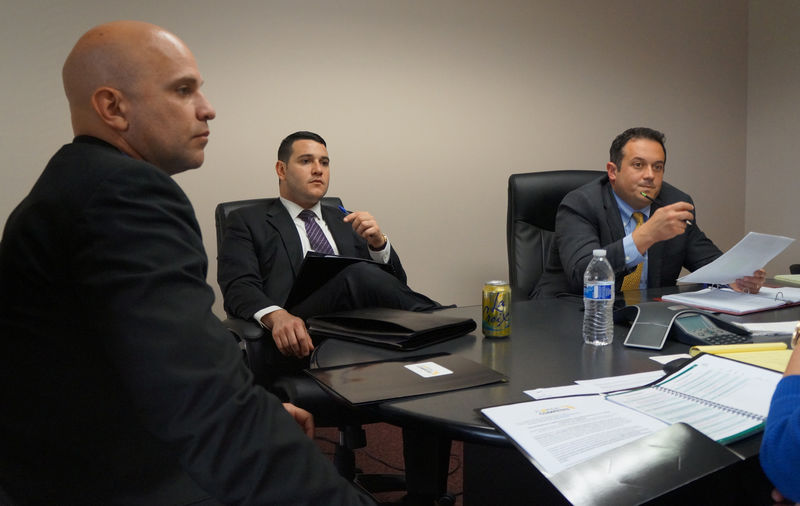By Letitia Stein
TALLAHASSEE, Fla. (Reuters) - A Republican, a Democrat and a lobbyist for leading businesses in Florida huddled this spring at the state Capitol, mapping out the next move in a campaign to enact the first statewide LGBT anti-discrimination law in the U.S. South.
A record number of Republican lawmakers had thrown their support behind proposed protections for lesbian, gay, bisexual and transgender people, and hundreds of companies backed the cause.
While the bill has so far fallen short with time running out on the legislative session, its lead backers were heartened by their progress and determined to retool for next year.
"We definitely need to ramp up the grassroots," said Joseph Salzverg, a lobbyist for Florida Competes, a group of more than 450 state businesses supporting LGBT protections. "There's a lot of Republicans that agree with the policy but are worried about the effect it has back home."
A year after transgender bathroom access erupted as a U.S. culture wars flashpoint, Florida is among the conservative statehouses where LGBT activists see momentum building for affirmative legislation.
The nation's third most-populous state, Florida could offer the next breakthrough in a national movement to advance LGBT civil-rights protections, viewed by advocates as stepping stones to their ultimate goal of federal anti-discrimination law.
Only 18 states, mostly concentrated in the U.S. West and Northeast, and the District of Columbia have laws that fully guard against LGBT people being fired from jobs, kicked out of housing or denied services in restaurants, hotels and other businesses. This fight continues even after a U.S. Supreme Court ruling in June 2015 that legalized same-sex marriage nationally.
Florida's strategy, years in the making, aims to build bipartisan support with economic arguments and the passage of similar measures locally that show the LGBT protections can succeed. The bill's backers must convince a Republican-controlled state legislature that all of Florida benefits from LGBT protections.
"It's really about the math of being based here in Florida, but competing on a global market," said John "J.T." Tonnison, president of Florida Competes.
Tonnison is chief information officer of Tech Data Corp, a technology distributor. In the state capital of Tallahassee this spring, he told legislators about a prized recruit reluctant to relocate from California, concerned about a gay son visiting a state without strong protections.
"It sets us apart in a less-than-positive light," Tonnison said.
BUILDING BIPARTISAN SUPPORT
Local LGBT protections are now in place in communities representing 60 percent of Florida's more than 20 million residents. In conservative north Florida, the state's largest city, Jacksonville, recently passed a nondiscrimination policy after a fight that lasted years.
Local successes helped convince 19 Republican legislators to join 52 Democrats this year to cosponsor legislation that would add sexual orientation and gender identity to Florida's civil rights statutes, just shy of a majority in the 160-member legislature.
Representative Joe Gruters, an anti-abortion activist who co-chaired President Donald Trump's state campaign, was among the first Republicans to sign on. Perhaps an unlikely LGBT ally, the first-term lawmaker said the case made by advocates, and a prominent conservative colleague's support, resonated with him.
"I will continue to fight for this, and for any type of right, that treats people fairly," Gruters said. "It's going to happen."
By contrast, the Florida Family Policy Council, advocating for conservative social values, decried the legislation as an intrusion on religious freedoms and public safety by allowing men into women's bathrooms and private facilities.
Such LGBT measures are "weapons to punish Christians for simply acting out their faith in the marketplace," said its president, John Stemberger.
"People are trying to force other people to do things," he added. "Why can't we just disagree?"
But backers see Florida as a model for other states engaged in long-term legislative efforts, including Ohio and Pennsylvania.
"Attracting bipartisan support really proves this isn't an urban versus a rural issue, or a Republican versus Democratic issue," said Dan Rafter, a spokesman for the advocacy group Freedom for All Americans.
Florida, and most other states, avoided fights this year over transgender bathroom access, possibly dissuaded by the national boycotts organized against North Carolina before its recent roll-back of restrictions enacted in 2016.
Nonetheless, Florida's LGBT protection bill never got a hearing during this session, which will end within days. The legislature's leaders did not comment on what stalled the measure.
Supporters are reorganizing for next year with a more pointed message.
"Inaction is not neutral," said Hannah Willard, public policy director for the advocacy group Equality Florida.
During the strategy meeting last month at the state Capitol, Republican Representative Rene Plasencia proposed mobilizing business supporters to engage legislators in their hometowns.
"We are protecting people's rights to live freely, to not be disadvantaged economically, because of the personal choice of who they love," he said.
Looking over a list of lawmakers not yet on board, the lead Democrat behind the House bill agreed.

"We need to persuade people before they get to Tallahassee," Representative Ben Diamond said. "That’s the challenge."